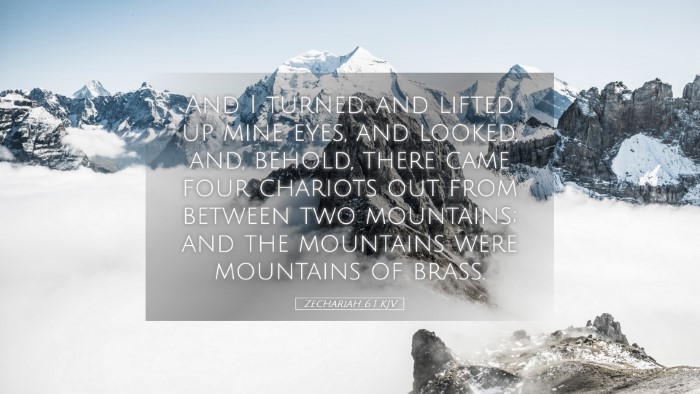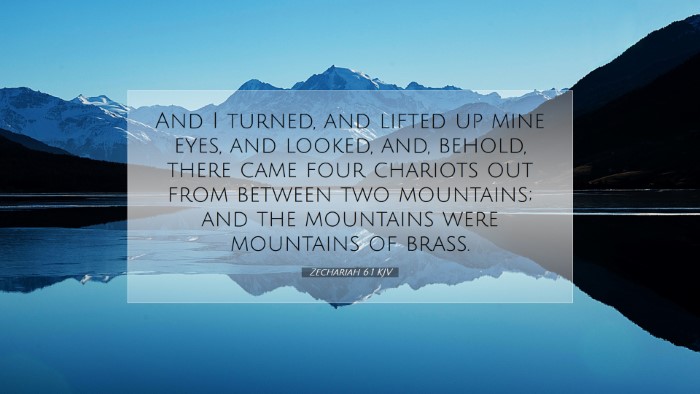Old Testament
Genesis Exodus Leviticus Numbers Deuteronomy Joshua Judges Ruth 1 Samuel 2 Samuel 1 Kings 2 Kings 1 Chronicles 2 Chronicles Ezra Nehemiah Esther Job Psalms Proverbs Ecclesiastes Song of Solomon Isaiah Jeremiah Lamentations Ezekiel Daniel Hosea Joel Amos Obadiah Jonah Micah Nahum Habakkuk Zephaniah Haggai Zechariah MalachiZechariah 6:1
Zechariah 6:1 KJV
And I turned, and lifted up mine eyes, and looked, and, behold, there came four chariots out from between two mountains; and the mountains were mountains of brass.
Zechariah 6:1 Bible Commentary
Commentary on Zechariah 6:1
Zechariah 6:1 states: "And I turned, and lifted up mine eyes, and looked, and behold, there came four chariots out from between two mountains; and the mountains were mountains of brass." This verse is rich in imagery and symbolism, drawing upon themes of divine intervention, judgment, and the sovereignty of God.
Contextual Background
To fully appreciate this verse, it is essential to consider the context of the Book of Zechariah. Zechariah, a prophet during the post-exilic period, emphasizes the restoration of Israel and the coming of God's kingdom. His visions are part of a series meant to encourage the Jewish people as they rebuilt their nation and temple after exile.
Interpretation of the Chariots
The four chariots mentioned in the verse symbolize God's power and action in history, particularly in regard to His judgment against the nations and restoration of Israel.
- Chariots as Agents of Divine Judgment: The imagery of chariots suggests swift action and military might. The presence of four indicates completeness and universality in God's judgment.
- Symbolizing the Four Corners of the Earth: The four chariots can also be interpreted as encompassing the whole earth, illustrating God's authority over all nations.
- Links to God's Sovereignty: The passage reflects God’s sovereignty over history and His ability to control the moral compass of nations.
The Mountains of Brass
The mention of “two mountains” that are “mountains of brass” also carries significant symbolism:
- Mountains as Strongholds: Mountains often signify strength and stability in biblical literature. Brass, known for its durability, points to the unyielding nature of God's will in the unfolding of His plans.
- Dual Nature of the Mountains: The two mountains may represent a contrast or duality—perhaps between judgment and mercy, or between secular powers and divine authority.
Theological Reflections
This verse leads us to consider the following theological insights:
- The Assurance of Divine Presence: The vision reinforces the idea that God is actively involved in the affairs of humanity. For the Israelites, this was a comforting assurance amidst their struggles to rebuild.
- God’s Judgment and Justice: The presence of chariots signifies that God, while loving and merciful, is also just and must deal with sin and rebellion.
- Hope in God’s Plans: The promise of restoration is central to Zechariah’s prophecies, revealing that despite current hardships, God’s ultimate plan for His people remains intact.
Commentaries and Insights
Matthew Henry
Matthew Henry emphasizes the authority of God over the nations depicted through these chariots, highlighting that no power can stand against His will. He sees the chariots as a symbol of the divine judgment that will ultimately bring about the restoration of Israel.
Albert Barnes
Albert Barnes provides a practical interpretation, suggesting that these chariots denote the agents that will be sent forth for the purposes of judgment on those nations that have oppressed Israel. He parallels the imagery of brass with the notion that God’s judgment is severe and unyielding.
Adam Clarke
Adam Clarke offers insights on the symbolic significance of the number four, explaining that it conveys completeness in God's plan. Clarke draws attention to the relationship between the physical and spiritual realms, illustrating how God operates through various means to fulfill His promises.
Practical Applications
For pastors, scholars, and theologians, Zechariah 6:1 serves as a reminder of the following practical applications:
- Understanding God’s Sovereignty: Encourage congregants to trust in God's control over their lives and the world, especially during uncertain times.
- Embracing Hope and Restoration: Use this verse to bring hope to those feeling lost or oppressed, reminding them of God’s promise to restore.
- Recognizing Justice: Stress the importance of justice in the church’s mission, emulating God’s own character in dealing with issues of wrongdoing.
Conclusion
In summary, Zechariah 6:1 encapsulates a pivotal moment of divine revelation that signifies God’s active role in history through the imagery of the chariots and the mountains. As we reflect on this verse, we are encouraged to embrace the themes of divine sovereignty, justice, and the hope of restoration that permeate the Book of Zechariah. These insights remain profoundly relevant to our lives today, serving as a guiding light for understanding God's ongoing work in the world.


